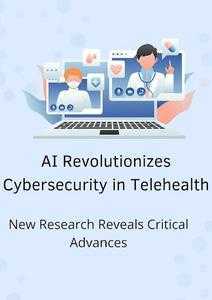

Cybersecurity breaches in healthcare are on the rise, costing an average of $9.23 million per incident. Krunal Manilal Gala's research highlights how artificial intelligence is transforming security, offering advanced protection against evolving cyber threats.
The Digital Healthcare Revolution
Telehealth adoption has surged, with 85% of physicians using it and 70% of healthcare organizations planning to continue remote care. Accelerated by global health challenges, this rapid digital transformation has reshaped patient-provider interactions, offering new opportunities while highlighting risks. Cybersecurity is now more critical than ever in safeguarding digital healthcare systems.
Escalating Cyber Threats
The dark side of digital healthcare's rapid expansion is evident in alarming security statistics. The healthcare sector witnessed a 55% increase in cybersecurity attacks compared to previous years, with 92% of these attacks delivered through email. The average cost of a healthcare data breach has reached $9.23 million per incident, making it the most expensive across all industries for over a decade. These breaches not only compromise sensitive patient information but also disrupt critical healthcare services and damage institutional trust.
AI as the Shield
Artificial intelligence has emerged as a powerful defender against cyber threats in telehealth. Advanced machine learning algorithms can now detect unusual login patterns, monitor data access, and identify potential security breaches in real-time. Studies show that organizations implementing AI-powered security solutions can identify and contain data breaches 27% faster than those without AI protection. The technology's ability to process vast amounts of data and identify patterns makes it particularly effective in preventing sophisticated cyber attacks.
Smart Defense Systems
Modern AI-driven security systems offer multiple layers of protection. They analyze global threat databases, monitor dark web activity, and track network traffic patterns. These systems can automatically lock compromised accounts, adjust firewall rules, and initiate backup processes when threats are detected. Organizations using such automated security measures have reported a 95% reduction in breach-related costs. The systems' ability to learn and adapt to new threats provides a dynamic defense against evolving cybersecurity challenges.
Privacy Challenges
Despite its benefits, implementing AI in healthcare security faces significant hurdles. Privacy concerns remain paramount, with 87% of healthcare executives citing data privacy as the biggest barrier to AI adoption. The challenge lies in providing AI systems with sufficient training data while maintaining patient confidentiality and complying with strict healthcare regulations. Healthcare organizations must balance the need for robust security measures with patient privacy rights and regulatory requirements, including HIPAA compliance.
Enhanced Authentication Measures
AI-powered systems have revolutionized authentication processes in telehealth platforms. By implementing adaptive multi-factor authentication and analyzing behavioral biometrics, these systems provide stronger protection against unauthorized access. The technology can detect suspicious patterns in user behavior and automatically adjust security protocols.
Future Outlook
The integration of AI in telehealth security represents a significant step forward in protecting patient data. The global healthcare AI market is projected to reach $45.2 billion by 2026, growing at an impressive rate of 44.9%. This rapid expansion signals increasing confidence in AI's ability to safeguard digital healthcare services. As the technology continues to evolve, we can expect even more sophisticated security solutions that better protect patient privacy while maintaining the accessibility of telehealth services.
In conclusion, as noted by Krunal Manilal Gala, "With AI continuing to evolve, healthcare organizations must embrace these innovations while prioritizing patient privacy and trust. The future of secure telehealth depends on this delicate balance."